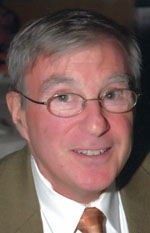The Debate Over Jewish Achievement: Exploring the Nature and Nurture of Human Accomplishment by Steven L. Pease, Deucalion, Sonoma, California; ISBN 978-0-9825168-4-3 ©2015, $19.95, p. 275, plus bibliography and index
By Fred Reiss, Ed.D.

WINCHESTER, California — The Jewish people are an enigma to historians, social scientists, and pundits of various stripes who cannot quite fathom how an unimportant group of people bound together by a religion can be so significant to the history of the world. “If the statistics are right,” said Mark Twain more than a century ago, “the Jews constitute but one quarter of one percent of the human race. It suggests a nebulous puff of star dust lost in the blaze of the Milky Way. Properly, the Jew ought hardly to be heard of, but he is heard of, has always been heard of. He is as prominent on the planet as any other people, and his importance is extravagantly out of proportion to the smallness of his bulk.”
Recent statistics show that of the more than seven billion people on earth, only about 14 million, or about 0.2 percent of the world is Jewish. Yet, Jews have won a disproportionate number of Nobel and Pulitzer Prizes, Kennedy Center Honors, and Academy Awards, to name a few. They are prominent in the professions and as students, disproportionally large in numbers on the Ivy League college campuses.
Nature, nurture, and culture are some of the reason given by numerous authors attempting to explain this conundrum. Steven Pease, author of The Debate Over Jewish Achievement, reprises material from his previous book The Golden Age of Jewish Achievement and brings the record of Jewish accomplishments up-to-date. However, in The Debate Over Jewish Achievement, he shifts the emphasis from merely offering a description of Jewish prominence to asking the question, “Why are the accomplishments of the Jews so out of proportion to their numbers in the population?”
After examining recent disputes among proponents of genetics, childrearing, and Jewish culture in Part I, Pease rejects the notion that Jews have a greater frequency of high IQ then the general population, concluding that “if it is genetic, it appears not to be just the genetics of intelligence.” Jewish upbringing and culture, or at least some combination of culture and genetics, appeals to him as more credible answers. Before focusing in on these, he digresses to examine and then comment on and reject as plausible some common myths about Jewish success, including chance; being God’s chosen people; and anti-Semitism, in the sense that Jews cheat or have “the deck” stacked in their favor.
Pease cites several contemporary books and journal articles about Jews, nations, organizations, and religions as evidence that cultural values, deep-seated beliefs and underlying assumptions for being successful, “make an immense difference in who we are…and what we accomplish.” To give a couple of examples, he refers to Senor and Singer’s 2009 book Start-up Nation, which describes Israel’s meteoric rise from a predominantly agricultural nation to a world-renown high-tech country, offering intelligence and cultural history as the reasons.
Botticini and Eckstein’s 2012 book The Chosen Few is presented as an example in which culture affects genetics and together they become the driving forces behind Jewish success. These authors theorize that the first century dictum of Rabbi Yehoshua ben Gamla, requiring all fathers to educate their sons beginning at age six, is a watershed moment in Jewish history. They propose that fathers refusing to heed ben Gamla’s pronouncement “dropped out” of Judaism, perhaps for another religion, because of the Jewish community’s shunning of illiterate families. However, those fathers investing in the education of their sons, a self-selection process, and often a hardship in an agricultural-based economy, all but guarantees marriage among members of the Jewish educated class, setting the stage for a smaller but more robust religion of highly literate people and providing a way for Jews to give up owning land and working farms in favor of portable labor.
Pease continues his arguments in favor of culture by naming many sources explaining how the Diaspora and other historical circumstances, including the Enlightenment, immigration to America, and the Holocaust, supported and strengthened Jewish culture. He recognizes that although there are many examples of Jews in important positions in past eras, Jewish accomplishments disproportionate to the general population are not part and parcel of Jewish history. “Whether it arose from predominantly cultural or genetic origins, or some mix of both, there is simply no question that from roughly 1820 on, Jews moved from being an interesting footnote in the history of high achievers to center stage.”
In Part II, Pease provides a chronology of the nature/nurture debate by listing, in detail, more than 180 books, article, and studies covering this topic from the mid-eighteenth century, with a synopsis of a book by “biologist” Jean-Baptiste Lamark through a July 2014 New York Times article written by social and political columnist David Brooks, entitled “Further Reflections on Culture”.
Pease takes no stance and makes no final judgments on why the Jewish people are so accomplished. Yet, the evidence seems to suggest that the Jewish people’s success is, at the very least, a product of their cultural imperative, a willingness to sacrifice for education, and the opportunities made available to them since the Enlightenment. Pease has successfully gathered into one place a thorough examination of the topic and The Debate Over Jewish Achievement will not only be an enjoyably and enlightening read, but I believe will be often cited and used as a reference book for years to come.
*
Dr. Fred Reiss is a retired public and Hebrew school teacher and administrator. He is the author of The Standard Guide to the Jewish and Civil Calendars; Ancient Secrets of Creation: Sepher Yetzira, the Book that Started Kabbalah, Revealed; and a fiction book, Reclaiming the Messiah. You may comment to him at fred.reiss@sdjewishworld.com.